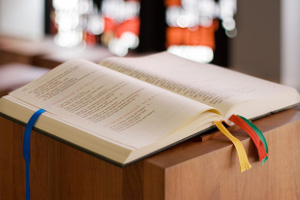 In the Hebrew of this passage there are two odd things to note.
In the Hebrew of this passage there are two odd things to note.
The first is in verse 7 that begins with the ‘gracious deeds’ (hasde from hesed) of the Lord. This word is hard to translate and we come across it in our English bibles often as ‘loving kindness’ or ‘mercy’. You could also think of ‘goodness’, ‘friendship’ or ‘keeping the covenant’.
The Hebrew bible uses this word a lot but hardly ever in plural: ‘kindnesses’. The plural seems to echo the ‘ages’ (olam) at the end of verse 9. This Hebrew word does not only indicate the past as the translation ‘of old’ references but also carries into the future. This is a plural of time as the ‘gracious deeds’ are a plural of attitude. In both there is a sense of overflowing.
The other thing to note is that the Hebrew in the beginning of verse 9 is unclear. The Masoretes (Jewish scholars between 6th and 10th century) read: “In all their distress he was distressed; the angel of his presence saved them”; while the Septuagint (Jewish scholars before the Common Era who translated the text into Greek) read: “It was no messenger or angel but his presence that saved them.” I wonder whether we can preserve some of both these interpretations as we think of Joseph’s dream and the flight to Egypt (Matt. 2:13-23).
1 January 2017
Isaiah 63: 7-9
This weekly blog on one of the lectionary readings is by Anna-Claar Thomasson-Rosingh, Coordinator for the Centre for Encountering the Bible and Director of Studies for the Centre for Formation in Ministry.

Leave a Reply